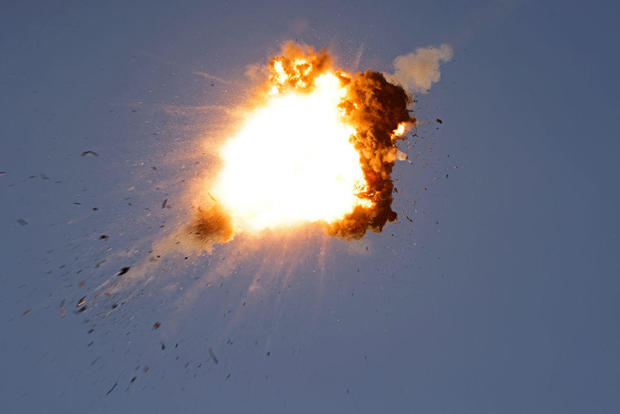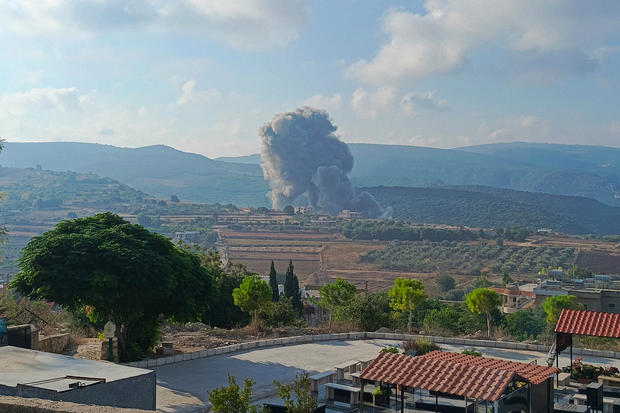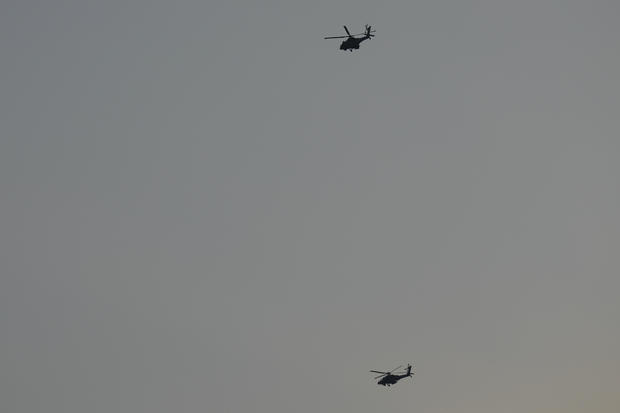
Israel and Hezbollah exchange strikes before pulling back, jolting region amid Gaza cease fire talks
What to know about the exchange of fire between Israel and Hezbollah
- Israel and the Hezbollah militant group launched their heaviest exchange of fire after months of strikes and counterstrikes. By mid-morning Sunday, it appeared to have ended, with both sides saying they only aimed at military targets.
- Authorities in Lebanon said the Israeli strikes killed three people, while there were no reports of casualties on the Israeli side.
- President Biden is closely monitoring the events in Israel and Lebanon. “At his direction, senior U.S. officials have been communicating continuously with their Israeli counterparts,” National Security Council spokesperson Sean Savett said in a statement.
Here’s a look at where things stand:
JALAA MAREY/AFP via Getty Images
What happened early Sunday?
The situation between Israel and the Hezbollah militant group remains tense. The exchange of fire between the two early Sunday threatened to trigger a broader region-wide war that could torpedo ongoing efforts to forge a cease-fire in Gaza.
The Israeli military said around 100 warplanes launched the airstrikes targeting thousands of rocket launchers across southern Lebanon. It said it struck because Hezbollah was planning to launch a heavy barrage of rockets and missiles toward Israel. Soon after, Hezbollah announced it launched an attack on Israeli military positions with a large number of drones. The Iranian-backed group had been promising for weeks to retaliate for Israel’s assassination of Fouad Shukur, one of its founding members, in Beirut last month.
KAWNAT HAJU/AFP via Getty Images
By mid-morning, it appeared that the exchange had ended. At least three people were killed in the strikes in Lebanon, while there were no reports of casualties in Israel.
Fears have been high in recent weeks that the Israel-Hamas war in the Gaza Strip could escalate into a regional conflict after the Israeli strike which killed Shukr, and a suspected Israeli assassination operation in Iran killed Hamas leader Ismail Haniyeh.
Earlier this month, White House national security spokesperson John Kirby said the U.S. was preparing for a possible attack by Iran and its proxies in retaliation for those assassinations.
The USS Abraham Lincoln, an aircraft carrier equipped with F-35 fighter jets, and the USS Georgia, a guided missile submarine, were recently deployed to the Middle East in response.
Diplomacy to de-escalate continues amid cease-fire talks
The attacks come as delegations from the U.S., Israel, Qatar and Egypt are holding another round of cease-fire talks in Cairo.
A spokesman for the National Security Council, Sean Savett, said President Biden was “closely monitoring” the events in Israel and Lebanon and that he has been engaged with his national security team throughout the evening.
Ariel Schalit / AP
“At his direction, senior U.S. officials have been communicating continuously with their Israeli counterparts,” Savett said. “We will keep supporting Israel’s right to defend itself, and we will keep working for regional stability.”
Defense Secretary Lloyd Austin spoke with his Israeli counterpart, Yoav Gallant, about Israel’s defenses. The chairman of the Joint Chiefs of Staff, Gen. CQ Brown, is on a visit to the region that is expected to take him to Israel, Egypt and Jordan.
The U.S. military had no involvement in Israel’s preemptive strikes on Hezbollah, according to a U.S. official.
The U.S. is hoping that all sides can stop escalating since both Israel and Hezbollah are publicly claiming success, and the initially assessment is that the blowback from this strike is contained. An Israeli official also told CBS News that it appears Hezbollah is deterred.
Multiple sources in the region told CBS News that the U.S., Qatar, Israel, and all relevant actors are now sending the message to both Hezbollah and Iran to de-escalate. Three sources told CBS that the Qatari Prime Minister Mohammed bin Abdulrahman bin Jassim Al Thani is still scheduled at this point to travel Monday to Tehran to brief Iranian leaders on diplomacy underway regarding Gaza and to dissuade any potential Iranian attack on Israel.
The strikes are not disrupting the diplomacy underway in Cairo where the U.S. and Egypt are trying to negotiate a ceasefire in Gaza. CIA director William Burns and Mr. Biden’s top Mideast adviser, Brett McGurk, remain in Cairo negotiating the details of how to implement a potential hostage and prisoner exchange between Hamas and Israel. An Israeli official confirmed that Israeli delegation is still expected to participate today.
Qatar and Egypt are acting as intermediaries with Hamas, as the U.S. is barred under American law from directly negotiating with the terrorist group. However, an official in the region confirmed to CBS News that the Doha-based political leadership of Hamas has sent a senior delegation to Cairo, which is led by Khalil Hayya.
Hayya previously served under Ismail Haniyeh as the lead on the Hamas negotiating team until the Israelis assassinated Haniyeh a few weeks ago. That physical presence of a political delegation in the same building is helpful to diplomats as they get down to the nuts and bolts of deal-making, but all parties acknowledge that the real decision maker remains Yahya Sinwar who is commanding from underground in Gaza.
The potential deal would be a six-week cessation of violence, an exchange of the most vulnerable prisoners including Americans, the release of Palestinian prisoners from Israeli detention, and a surge of humanitarian aid into Gaza. During Phase One of this deal, talks would continue about an enduring ceasefire. This deal is the centerpiece of the Biden administration’s strategy to lower regional tensions far beyond the 25 miles of the Gaza strip.
Margaret Brennan
contributed to this report.
More
More
Source: cbsnews.com

